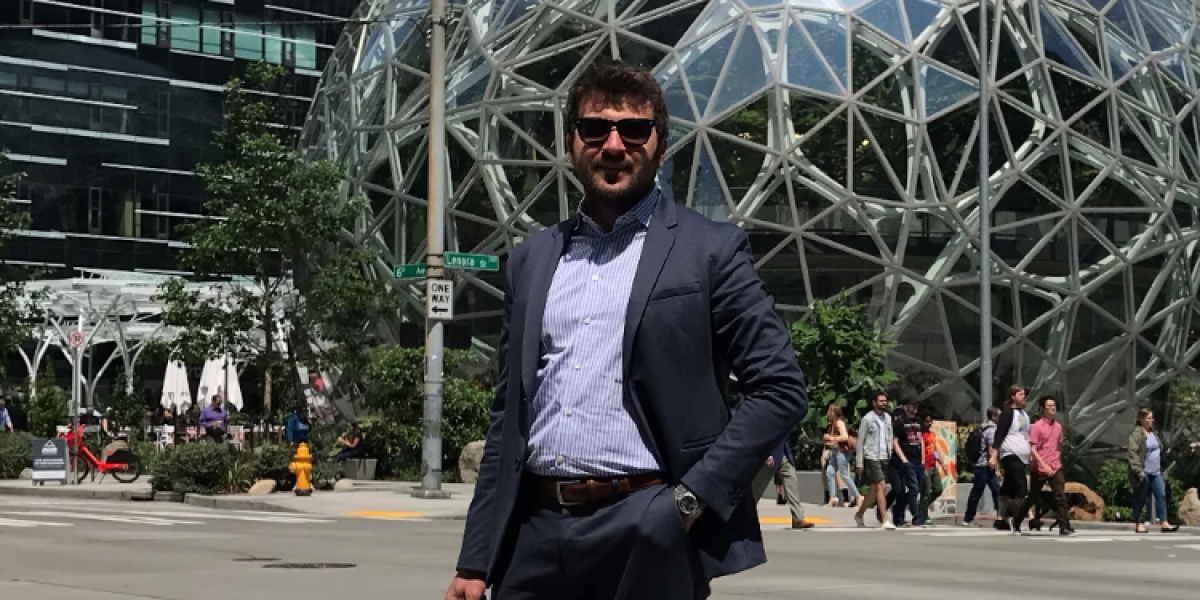
Umberto's journey from the serene town of Bolzano, Italy, to the bustling streets of New York City is both inspiring and captivating. With roots tracing back to Naples and a familial connection to Brooklyn, Umberto's path to America was driven by a profound desire to connect with his heritage and make his mark in the land of opportunities.
Can you please introduce yourself and tell us what brought you to the US?
Ciao, my name is Umberto, and I was born in Bolzano, a little paradise in the north of Italy in the middle of the Dolomites mountains. Bolzano is a bilingual Italian and German region, so it gives you the gift of growing up learning two languages almost automatically. My family is from Naples, and my grandfather was born in Brooklyn, New York. In my room, I had a picture of him stating, "born in Brooklyn," and I have always been interested in learning more about my family roots and discovering this great country, America. So when I was 27, I had the chance to move to the US with an Italian company that specializes in the strategic development of Italian food brands. They were able to sponsor the visa, and I came over to chase my American dream.
For how long have you been in the US, and what made you choose to move to NYC?
I moved to NYC in 2017, so it has been seven years. I always thought that NYC would have been the perfect place to express yourself and achieve any goal you would like to reach in life. NYC is vibrant, fast, stressful, and just New York, the city that never sleeps. In the case of the career that I started in Italy working for a company, leader of Wafer (Loacker), NY and the Northeast in general are the centers where most of the food and beverage companies have their US local offices and operations. In this way, it is easy to connect with many professionals and companies to learn more about their strategies for development and make a good and healthy network.
How difficult was it for you to secure a job and a work visa in the US?
The US immigration laws don't make it easy at all. Coming over here with a visa (but also in other cases, such as getting married to an American citizen) is quite challenging. Usually, companies from abroad can sponsor mostly visas to professionals who are citizens of the same country of origin as the company sponsor (E visa); there are also other kinds of visas that companies can sponsor, such as H1B or L visa, but in any way, the process is not easy. The company must prove with documents and detailed information why they are sponsoring a particular person and why this person has an extraordinary skill they cannot find in US candidates. In my case, I had a first J1 visa, which is a trainee visa (even though I had more than eight years of experience) with a company that was importing Parmigiano Reggiano. I met their marketing manager, Giulia, at the airport in Milan while going to New York for vacation, and one year later, they sponsored my visa. After that experience, I was sponsored by an Italian premium producer of chocolate and gelato and appointed as their US and Canada development manager. I was able to receive an E visa (investor visa category).
What are your views on the American job market? What skills and qualities does one need to successfully build a career in the US?
The work environment here in the USA is competitive and very dynamic. There is a very positive mood when doing business. Professionals are very engaged in learning more about companies, such as Italian food and beverage producers, and developing interesting and strategic projects. To succeed here, you will definitely need to be passionate, willing to work hard, and never give up when things are not going as planned. Definitely, the US work system has different standards from, for example, the European model; there are fewer vacations, working contracts are at will, so at any time, with or without cause, your employer can terminate your position, and there's less margin of error and protection, such as working unions, which are very strong in Europe. At the same time, when you work with motivation and bring good results, the reward is immediate, and the network surrounding you appreciates and values what you do.
How did you land in the world of wine after building a career in food and beverages? How challenging was it?
After many years in the food industry (I worked for cheese, pasta, prosciutto, chocolate, and olive oil producers), I was really interested in learning more about this fascinating and important market segment. I consider myself quite perseverant, so I knew that Freixenet Mionetto was a very established and organized company in the US. I wrote a message directly on LinkedIn to the CEO of the US office. Again, building relations and networks is the key in this country, and building trust is vital. Six months after our first coffee, he brought me on board. Enore Ceola, now in charge of all the Americas for our group, is a mentor to me; his vision and strategy are inspiring and educational at the same time. Like other categories, wine is very challenging; many new trends are growing faster, such as RTDs and nonalcoholic beverages. A producer needs to understand that the US is a vast country with many opportunities, but at the same time, it requires a lot of investment in professionals and marketing.
How was the culture shock for you when you arrived in the US, and how did you overcome it?
I am a resilient person, so I didn't really have a big shock. I actually think that there is nothing better in life than seeing what is out there in the world and, if possible, learning as much as you can. I would say that the cost of living and the food are two aspects that I found not easy to process, but then you can find your balance and settle. It was definitely helpful for me to spend time and engage in relations with the Italian community/network. There are a lot of Italians and Europeans here in NYC and the US, and it is always a pleasure to meet up for dinners and networking events. The opportunities to meet people are endless. My best advice is to always be out talking with people, tell your story, and learn from others' stories. This is always a good way to improve yourself.
How difficult was it to meet new people, make new friends, and forge new relationships?
I think it really depends. With the kind of work position I had and still have, when I'm traveling, I get to meet a lot of people, but when I come home, the time to rest is important. Sometimes, it can't be easy to build a lot of relations immediately, not that you need many. I was able to meet new friends through events or connecting through work. Funny story: I met my wife on Tinder, a famous dating app, which is a great tool here in America, even to just make new friends. Thanks to Tinder, I now have two amazing daughters, Olivia and Kennedy, so God bless America and Tinder!
How did it feel to be back to your roots, with the US being your grandfather's homeland?
It felt unreal. I had always dreamed of it, and when you make it, you feel so happy and excited that it almost feels unreal. The most emotional moment was when, in November 2023, I became a US citizen. I cried for most of the ceremony; I was thinking about myself all those years in my room in Italy, looking at that picture of my grandfather, and thinking about America, what it is, what it could be, and how to get here.
Tell us what you miss the most about Italy.
My mother, who is the most important person in my life, but also her food. When I get home, my lovely mother Antonella still wakes me up with a pleasant cup of espresso coffee; she cuts my apple after lunch and irons my shirt; how can't I miss all these?
In your opinion, what does it take for an expat to make the American Dream come true? Is the American dream accessible to everyone?
Leaving your family, work, friends, and habits is the toughest part; you need to be fearless and have a lot of good intentions. Complaining is very easy, and success is not for everyone, which is ok. But my previous manager used to say: “Umberto, not everyone can be ambitious," so coming over here requires a lot of time and energy sacrifices. At the same time, as mentioned previously, people see and recognize what you do and reward you for it. The American dream is accessible to everyone. I come from a very humble family where my father worked in the army, and my mother was a housewife. I didn't have the chance to attend any college or MBA programs. Overall, if you have the energy and the mentality to make positive changes in your life, you can do it.
2024 is the year of elections in the US. As an expat in the US, what are your views on the state of immigration in the country, and how do you think the election results will impact immigration?
Even though I am now a US citizen, of course, I also consider and feel lucky to be an immigrant. The story taught us all that immigration brings support, innovation, and new visions. America is such a big country with so many opportunities, and because of this, it attracts a lot of people. Like every country in the world, regulating immigration is not an easy job, but it is always important for the American administration to realize that America is a country built on immigration, with the sacrifices and hard work of immigrants.
I actually experienced difficulties in 2018 when I applied for my E visa, as the administration at the time brought up the American First strategy, which was making it almost impossible to get a sponsored visa. I hope that whoever will be in charge will not make the immigration process tough or almost impossible for those who are pursuing this opportunity in the proper way.
At the same time, I think the country has more significant issues than immigration to fix and improve, such as maternity leave for women, healthcare support, and childcare.



















